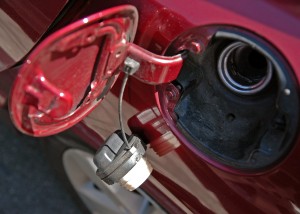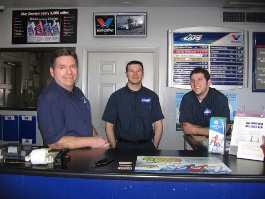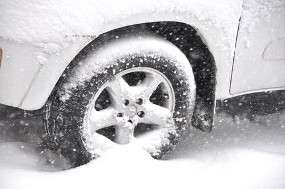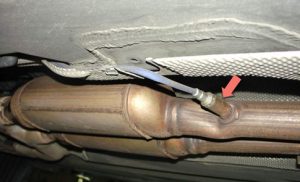 Good news! The days when drivers had to change their spark plugs every couple of years has ended. Back in the day, spark plugs really did wear out that often. Now, a couple of things are different…
Good news! The days when drivers had to change their spark plugs every couple of years has ended. Back in the day, spark plugs really did wear out that often. Now, a couple of things are different…
First, spark plugs have a better design and are made of better materials that last longer for drivers. The second reason spark plugs used to have to be changed more often is because carbon deposits would build up in them when fuel wasn’t burned completely and foul them up. But with modern engine management controls that doesn’t happen as often.
Engine control computers precisely time when fuel is injected into the engine and when the spark plugs fire. Unless something is wrong, spark plugs just don’t misfire as often now.
Electricity from the battery goes into a coil that allows power to build up to anywhere from 12,000 to 45,000 volts, depending on the vehicle. The engine management computer tells the coil when to release the power to the spark plug. The electricity travels through a wire from the coil to the spark plug. At the tip of the plug, a spark jumps between two electrodes and ignites the gas in the combustion chamber.
Some engines have more than one coil. Coils wear out and need to be replaced occasionally. Also, spark plug wires can wear out and need to be replaced. Modern engines in vehicles are delivering more power and better fuel economy all the time. That’s largely credited to fast engine control computers, advanced sensors, electronic ignition and improvements to the lowly spark plug. It will be interesting to see where future developments take us.
One last thought…it’s important to have the right kind of spark plug for your vehicle. Because engines are designed to run with different internal temperatures, spark plugs have different designs that work properly within those temperatures. Your service adviser at Express Car Care will be able to get the right plugs for your vehicle and be able to advise you as to when you should replace your spark plugs as well.

 For most people buying tires can be a big deal, so play it safe and consult with your friendly and knowledgeable tire professional about the proper size, type and grade for your driving needs. He can help you balance load requirements, performance, durability and cost.
For most people buying tires can be a big deal, so play it safe and consult with your friendly and knowledgeable tire professional about the proper size, type and grade for your driving needs. He can help you balance load requirements, performance, durability and cost. Question: How do I know when I need a wheel alignment?
Question: How do I know when I need a wheel alignment? No matter how well they’re made, vehicles will have design or manufacturing problems. And when the government thinks a problem is really serious, they require the manufacturer of the vehicle to issue a recall notice and to repair the vehicle at no charge to the owner. The manufacturer has to try to contact everyone who owns that type of vehicle so they can get the recall work done.
No matter how well they’re made, vehicles will have design or manufacturing problems. And when the government thinks a problem is really serious, they require the manufacturer of the vehicle to issue a recall notice and to repair the vehicle at no charge to the owner. The manufacturer has to try to contact everyone who owns that type of vehicle so they can get the recall work done. Hello Denver drivers. Today’s Express Car Care auto care post is focusing on your fuel filter. Is it time for a new fuel filter?
Hello Denver drivers. Today’s Express Car Care auto care post is focusing on your fuel filter. Is it time for a new fuel filter? Express Car Care Tech Question:
Express Car Care Tech Question: Your vehicle is much more to you than a transportation appliance. It gets you to work, helps you take care of errands, goes on dates, and takes you on vacations. You could almost say it’s part of the family, or maybe a business partner. You rely on your vehicle for so many things. We understand how important your car or truck is to your life. And we want you to know that you can trust your vehicle to us. You can rely on us to do all that we can to keep you safely on the road.
Your vehicle is much more to you than a transportation appliance. It gets you to work, helps you take care of errands, goes on dates, and takes you on vacations. You could almost say it’s part of the family, or maybe a business partner. You rely on your vehicle for so many things. We understand how important your car or truck is to your life. And we want you to know that you can trust your vehicle to us. You can rely on us to do all that we can to keep you safely on the road. Tire rotation is an important maintenance duty that extends the life of your tires and ensures safe driving. Let’s take a look at this simple and effective procedure.
Tire rotation is an important maintenance duty that extends the life of your tires and ensures safe driving. Let’s take a look at this simple and effective procedure. There are a lot of misconceptions about fuel grades-and by fuel grades, I mean, the octane rating. Names like “Standard”, “Super”, “Plus”, and “Premium”, lead people to believe that the octane rating/grade is associated with quality. Octane ratings are expressed as a number that typically ranges from 87 to 91 at the pump. The number doesn’t mean “better” but rather signifies the appropriate grade of fuel for a particular engine.
There are a lot of misconceptions about fuel grades-and by fuel grades, I mean, the octane rating. Names like “Standard”, “Super”, “Plus”, and “Premium”, lead people to believe that the octane rating/grade is associated with quality. Octane ratings are expressed as a number that typically ranges from 87 to 91 at the pump. The number doesn’t mean “better” but rather signifies the appropriate grade of fuel for a particular engine. Many people hear the term “Oxygen Sensor” and figure it must have something to do with sensing oxygen, but don’t really know much beyond that. Let’s break it down: your vehicle has an oxygen sensor in the exhaust manifold that measures how much unburned oxygen there is in the exhaust. The sensor reports its findings to the engine control unit (ECU), which knows how much oxygen there should be in the exhaust. Based on that information, the ECU will adjust the amount of fuel it sends to the engine.
Many people hear the term “Oxygen Sensor” and figure it must have something to do with sensing oxygen, but don’t really know much beyond that. Let’s break it down: your vehicle has an oxygen sensor in the exhaust manifold that measures how much unburned oxygen there is in the exhaust. The sensor reports its findings to the engine control unit (ECU), which knows how much oxygen there should be in the exhaust. Based on that information, the ECU will adjust the amount of fuel it sends to the engine.